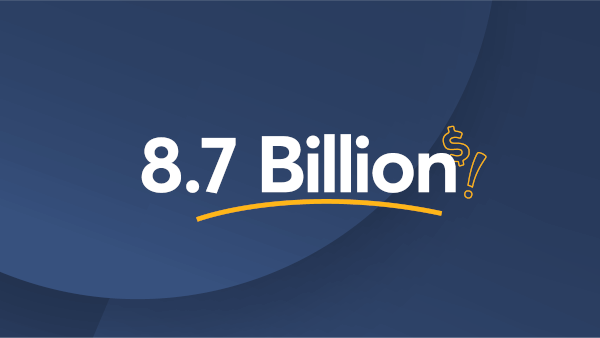Brex and Wise are Solving Growing Pain Points for Employers: Global Employee Reimbursements
The “Going Global” Challenge In today’s post-pandemic world where employees can work from anywhere and companies are more frequently hiring beyond their...

There’s an old saying that “it takes money to make money”. But as Americans are learning, in this country it takes money just to have money.
We’re talking about bank fees, friends. The actual costs of investing, saving, sending and withdrawing our own hard-earned money.
To learn more about Americans’ experiences with bank fees, Wise partnered with Ipsos to survey 1,000 people. As you’ll see, we learned some surprising things. We also asked personal finance expert Bobbi Rebell to give us some tips on saving money.
We want our report to shine a light on banks fees, so people can make more educated financial decisions. What follows is a summary of some of our more interesting findings, and you can read all of our findings below it.
The fees we know and the fees we don’t
With apologies to Forrest Gump: For Americans, banks are like boxes of chocolates. We don’t know exactly what we’re paying for.
The average American pays $329 in bank fees every year. (Bank Fee Finder Summary Report, 2017)
A vast majority of them are aware of 3 of these fees: ATM fees (91%), investment fees (89%) and overdraft fees (88%).
But they’re surprised to learn of others – including transaction search fees (39%), paper statement fees (37%), early account closure fees (35%), minimum balance fee (34%), and international money transfer fees (32%).
Very few people (5%) think they’ve encountered international money transfer fees – but they’re more common than you think.
The fees add up for the banks...but not for us
JPMorgan Chase, Bank of America, and Wells Fargo earned more than $6 billion from ATM and overdraft fees in 2015 alone (Time, 2016).
Needless to say, bank fees are good business. But they do nothing for consumers. “If you choose to have Netflix, you actually get to watch Netflix,” says Rebell. “Paying a bank fee gets you nothing but less money for you.”
We’re getting better at avoiding fees – but our priorities are still off
Seven in ten (69%) Americans would rather drive 10 extra minutes to an ATM operated by their bank than pay an out-of-network ATM fee, and women are even more likely (73%) to drive out of their way than men (64%).
“We’ll go 10 minutes to avoid a fee – that’s a lot out of the way!” says Rebell.
“For less than 10 minutes, you can make a phone call to a bank and ask them to waive a fee. If there’s resistance, ask how to qualify to have the fee waived in the future, and then do that. If you can’t, maybe it’s time to find a new bank.”
For those of us who’d like alternatives to banks, there are plenty of financial technology companies that will help us manage our finances. But only 35% of Americans say they’d be willing to turn to a tech company that offers financial services (like Amazon, Apple, or Facebook) to save money.
“What’s the breaking point to switch?” asks Rebell. “As people become more aware of fees, they’re more likely to take action. But it will vary for every person depending on their tolerance level.”
Millennials have more to learn too
Both millennials (18-34) and Gen-Xers (35-54) are considerably more likely than those over 55 to pay ATM fees, monthly/annual maintenance fees, minimum balance fees, debit card replacement fees, international money transfer fees, and teller fees.
Surprisingly, the millennial impulse to value travel doesn't always translate to literacy in international finance. Only 54% of millennials knew about the hefty fees associated with international transfers before being charged. In contrast, 78% of people 35-54 and 86% of people over 55 knew about these fees.
“Millennials love to travel, and there are a lot of ways for them to save when visiting, working or living abroad,” says Rebell. “One critical way is to avoid international money transfer fees. You can pay for experiences in advance, or use services like Wise to send money to the people you’re visiting and have them take cash out for you.”
For the full report please email press@wise.com
*Please see terms of use and product availability for your region or visit Wise fees and pricing for the most up to date pricing and fee information.
This publication is provided for general information purposes and does not constitute legal, tax or other professional advice from Wise Payments Limited or its subsidiaries and its affiliates, and it is not intended as a substitute for obtaining advice from a financial advisor or any other professional.
We make no representations, warranties or guarantees, whether expressed or implied, that the content in the publication is accurate, complete or up to date.

The “Going Global” Challenge In today’s post-pandemic world where employees can work from anywhere and companies are more frequently hiring beyond their...

Hidden exchange rate markups estimated to cost Americans $8.7 billion in 2019 Consumers and businesses lose billions every year when they send and spend money...

Our mission has become irreversible, the company financially independent, and adoption continues to accelerate. Thank you - Wise customers - for...

To the Wise community When my co-founder and I launched Wise 7 years ago, we set out to irreversibly fix how money doesn’t work across...

Money is information. Using, storing and moving money should be as cheap and instant as exchanging information. As cheap as sending an email. And certainly it...

The grassroots story of how Hubstaff customers helped them make the switch to Wise API for mass payouts. And why they're happy they found the solution.